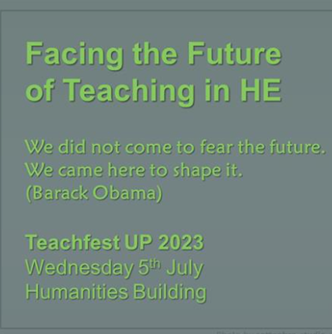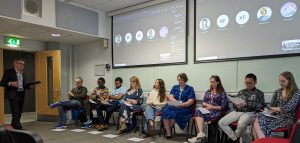
July 21, 2023, by Laura Nicholson
Facing the Future of Teaching in Higher Education
The Learning Technology Team recently had the pleasure of supporting Teachfest (University Park), and the theme for this year was ‘Facing the Future of Teaching in Higher Education’. The Teachfest events have an informa l atmosphere and provide opportunities for educators to share their practices, discuss and reflect on teaching and learning experiences, and exchange ideas in a friendly and supportive environment. In addition to presentations and workshops throughout the day, the inclusion of a student and staff panel encouraged a holistic approach to discussing the challenges facing education.
l atmosphere and provide opportunities for educators to share their practices, discuss and reflect on teaching and learning experiences, and exchange ideas in a friendly and supportive environment. In addition to presentations and workshops throughout the day, the inclusion of a student and staff panel encouraged a holistic approach to discussing the challenges facing education.
What is engagement?
Researchers and scholars have proposed various definitions of student engagement over the years. Earlier researchers, such as Skinner and Belmont (1993), characterised student engagement as ‘sustained behavioural involvement in learning activities.’ However, the concept of engagement has evolved significantly and is now argued to encompass cognitive, emotional, behavioural, social, physical, and cultural dimensions. This broader perspective acknowledges the multi-faceted nature of engagement but raises challenges when monitoring and assessing it effectively. The speakers at Teachfest provided great insights into various elements of student engagement, providing thoughtful contemplation and ideas for action.
The challenges of monitoring engagement
Assessing engagement often involves making subjective judgements, relying on interpretations of behaviours and interactions. Engagement is also context-specific and time-consuming for educators to effectively monitor. This makes it difficult to establish a standardised approach. However, one of the speakers, Fui-Theng Leow, identified how using Moodle reports and logs can be a useful indicator of student behaviour.
Fui-Theng Leow’s research focuses on developing metrics to monitor engagement. Part of her research involves utilising Moodle’s analytics to study student behaviour. This will then be used to explore the correlation between Moodle use and academic performance. The study focuses on four key areas relating to engagement: access patterns, log-in frequency, resource utilisation and forum participation. Fui-Theng then demonstrated how the data could be used to identify students at risk to then develop strategies for early interventions.
Moodle analytics is a great tool to monitor student participation. Take a look at our previous blog on optimising your Moodle module for tracking learners’ interaction with the material to find out more.
Attendance and engagement
Neil Hughes’s research includes blended language learning and digitally-enhanced teaching and learning. He discussed his paper on Transgressions and Transitions, with a rationale for including a mix of pedagogical practices in teaching and learning. These practices involve hybrid models of delivery, asynchronous written interactions and optional online seminars. We were fortunate that Neil had already completed a preliminary assessment of the impact of these teaching practices on student learning and engagement, yielding some thought-provoking findings.
Interestingly, Neil’s findings were that poor attendance did not translate into low levels of engagement. It was also noted that the data did not support the argument that poor attendance automatically results in poor performance or low satisfaction.
We often follow the belief that if a student is not attending face-to-face lectures, then they are not engaged. However, students may still be working through materials on the LMS and accessing resources multiple times, but just not attending in person. Whilst the availability of tools like Echo 360 lecture recordings could be argued to reduce attendance figures, they do offer flexibility in learning. Furthermore, a blended or hybrid approach to delivery can often cater more to individual learning preferences, enabling students to study and revisit complex concepts at their own pace.
If you are interested in learning more about using teaching and technology to design effective and engaging blended and hybrid courses then this MOOC may be of interest. Blended and Hybrid Learning Design in Higher Education, was released in 2023 on the FutureLearn platform and provides an opportunity to explore a range of perspectives on blended and hybrid learning.
Student views on engagement
One of the questions posed to the student and staff panel related to what they thought engagement meant and how we, as a university community, can help students and staff to engage well.
The importance of having opportunities to foster friendships with other people on their course was viewed as being key to feeling like they belonged, and indeed supported engagement in the sense that it made them more likely to attend in person, but not always!
Interestingly, the topic of anonymous marking was highlighted as having a potentially demotivating effect on some students and so could be a barrier to feeling a sense of belonging. It seems that with all the benefits anonymous marking brings, such as a fair and unbiased review of work, there is also another side. Some students may perceive the inability to provide feedback, which relates to their personal progress, as being detrimental to their sense of belonging.
It was interesting to hear this perspective as I had always seen anonymous marking in a positive light and had never considered it in terms of being demotivating. I believed that the anonymity provided an extra level of reassurance to the student and that this would be a motivator for student engagement, due to the reassurance that their work would be evaluated objectively. The multi-faceted side of engagement was again evident here in terms of what works to increase engagement for one student, may have the opposite effect on another.
Take away thoughts
Events like Teachfest always have moments that inspire and leave a lasting impression and there were so many more speakers that I haven’t had chance to mention. I am personally much more aware of the multi-faceted nature of engagement and its context-specific nature. The speaker’s experiences highlighted how behaviour alone is not truly indicative of engagement, which makes monitoring it objectively quite a difficult task. While one student’s absence may signify a lack of engagement, another student’s absence could indicate their exploration of a more personalised learning experience. It seems there are no universal markers for engagement but thankfully advances in technology mean that we now have a range of tools at our disposal enabling the creation of diverse learning experiences for all.
Teachfest events are open to all University of Nottingham staff. If you are interested in attending the next event it will be held at the Sutton Bonington campus on 19th December.
References
Skinner, E. and Belmont, M. (1993) ‘Motivation in the classroom: Reciprocal effect of teacher behaviour and student engagement across the school year‘. Journal of Educational Psychology. 85. 571-581. DOI:10.1037/0022-0663.85.4.571
No comments yet, fill out a comment to be the first


Leave a Reply